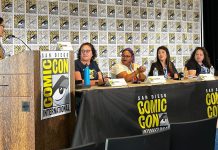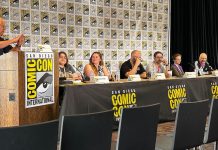By Victor Van Scoit
Comic books continue to reach mainstream audiences and have stretched into academia. At the Panels and Pedagogy: Teaching Comics panel, panelists Andrea Gilroy (University of Oregon), David Walker (writer, DC & Marvel), Douglas Wolk (Reading Comics: How Graphic Novels Work and What They Mean), and Trevor Dodge (Clackamas Community College) aimed to help answer questions that arise—teaching comic books, formal instruction for creators, and establishing the academic discipline of comics. While the conversation flowed along the more interesting insights came during the question and answer session.
The first question asked “What can the formal teaching of comics provide students?” “The great thing about a formal education setting is it links you, and in some cases begin to form a community.”, said Walker with regards to if an individual is self-taught. “If nothing else comics as a craft can be very solitary, and the academic environment can open you up to a sense of community that is absolutely essential to growth. But you don’t know how essential it is until you’re in it and experiencing it.” Others had more to offer from the craft of comics. “It gives you an audience—a small audience. It gives you deadlines. It makes you actually do the work which is a huge hurdle to get through,” began Wolk. “One of the things the Kurbert School teaches you is you got to do the work. Getting into the habit of making it work, make it happen, putting something on the page is huge.” This same thought process of learned professionalism continued with regards to the instructor as your first editor. “It’s also really helpful to have a teacher to say ‘There’s probably a better way for you to express what you want to express’ or ‘Have you really thought through what you want to express here?’” Gilroy, from the land of academia, added that a formal education can add a vocabulary and understanding of the form to speak of comics in more than just the nuts and bolts. Gilroy stressed, “The one thing that I think is really important is not to get elitist about it.” Ultimately the less we can be a stereotypical Simpson’s Comic Book Guy and be inclusive, the better for all of us.
Another audience member explained how she and her sister are really into comics, and while her mother sees how much they enjoy them, she is terrified in knowing how to read or approach comics. Were there any strategies they recommended? Walker’s solution was simple in that it was simply to read comics, but just make sure they’re the right ones. “I go back to, every single time, is Kyle Baker’s Why I Hate Saturn. The single greatest graphic novel of all time. Anybody can read that book because it doesn’t look like a regular comic, but it’s one step removed. Once you’ve read that you sort of know how to read comics.” Walker made the audience snicker when followed up with “The one thing someone have never said is ‘I don’t know how to read the funnies.’ Everyone knows how to read the funnies and all [comics] are a longer version of the funnies.”
The final questions dealt with the medium itself, the potential in teaching other subjects, and training. Walker noted quickly, “I read Dickens as a comic before I ever read Dickens. I read Melville as a comic before I read Melville. Dumas. That was my introduction to storytelling and what is considered classic literature. I have a friend who just cowrote a graphic novel on economics out of the Netherlands, I think, where it explains how their economic system works.” This is one of the most powerful abilities of comic books—being able to disseminate lots of information in a single package. The thoughts from the panel continued that most of America learn to read with the juxtaposition of text and imagery. Then later after a certain grade it’s considered crude to learn that way. The point driven home was that comic books can be a great tool to teach a myriad of topics to a myriad of readers and an amazing alternative for those even with learning disabilities.
A public school teacher asked what should she tell students that may want to go this router. Is that classic college degree needed? English degrees were noted for their importance to becoming a writer. Establishing a strong foundation in that area could only help to learn structure. Dodge spoke up with what often comes up in his area of teaching. “The question I always get is ‘I know that if somebody takes a welding class that they’ll know how to weld. If someone takes a comics class, how do they get a comic?’ Dodge continued, “It’s really about how do people translate education into career paths.” Wolk later added “‘How do I get a job in this?’ is not necessarily a question academia can answer. ‘How do I get better at this?’ is a question academia can answer.”
The creation of a job kind of came full circle with the last question of the panel. It was asked if there was a company that specialized in comic books for computer based training. The panel was stumped whether a company existed, but came to the conclusion that fuels the independent comic book scene. “Start your own company,” from Walker. The rest of the panel agreed that there is a large amount of talent available for working on these types of endeavors. Gilroy capped it off with, “The cool part is Artist’s Alley is upstairs.”
Sometimes it comes back to the familiar adage, “If it doesn’t exist it’s up to you to make it.”









